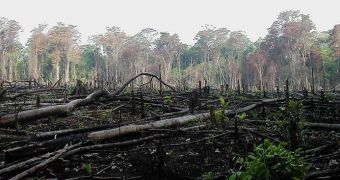A new report by the UN Food and Agriculture Organization (FAO) has determined that deforestation rates at a global scale have been diminishing for the past ten years. This event is not due to more people becoming aware of the importance of forests, but to the fact that China has been planting enormous amounts of new trees yearly. Additionally, Brazil has been implementing programs to preserve its rain forests, punishing those who cut down trees illegally. Still, the report highlights that some countries are still experiencing alarmingly high rates of forest loss, and says that this needs to end as soon as possible, the BBC News reports.
According to the document, entitled “Global Forest Resources Assessment 2010,” forest loss rates are highest in Africa and South America, where methods of controlling the phenomenon are lacking. Many governments still fail to acknowledge the magnitude of the problem, and some of them are too corrupt to be able to efficiently enforce protection programs. A different case was recorded in Australia, where very wide surfaces of what once used to be a forest were left barren. This happened on account of a massive drought that has been sweeping the nation for quite some time now.
“It is good news. This is the first time we've been able to say that the deforestation rate is going down across the world, and certainly when you look at the net rate that is certainly down. But the situation in some countries is still alarming,” tells the British news agency Mette Loyche Wilkie, a senior forestry officer at FAO and the coordinator of the recently-released reports. In the 1990s, statistics show that 16 million hectares of forests were lost annually, whereas this decade experienced a reduced mean, of 13 million hectares per year.
It is estimated that trees currently cover about 31 percent of all dry land on our planet, a much lower amount that just a few centuries ago. The good news is that the countries which experience the biggest loss in forests, Australia, Brazil and Indonesia, are either innocent of this, or taking active steps to reduce the phenomenon. “Both Brazil and Indonesia are reporting a significant drop in the loss of forests. In Brazil it's spectacular, and that's largely because there is a political goal to reduce deforestation by 80% by 2020 and that's supported by the president,” says Dr Loyche Wilkie.
“Not only have countries improved their forest policies and legislation, they have also allocated forests for use by local communities and indigenous peoples and for the conservation of biological diversity and other environmental functions. However, the rate of deforestation is still very high in many countries and the area of primary forest – forests undisturbed by human activity – continues to decrease, so countries must further strengthen their efforts to better conserve and manage them,” concludes the assistant director-general of the FAO Forestry Department, Eduardo Rojas.

 14 DAY TRIAL //
14 DAY TRIAL //